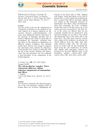 January 2021 in “Journal of clinical and cosmetic dermatology”
January 2021 in “Journal of clinical and cosmetic dermatology” Human skin responds to light with protective mechanisms, but more research is needed to understand these processes and their implications for health and therapy.
[object Object] 9 citations,
November 2020 in “The FASEB journal” Intermediate filaments are crucial for cell differentiation and stem cell function.
 40 citations,
December 2012 in “Epilepsia”
40 citations,
December 2012 in “Epilepsia” Neurosteroids change how GABA_A receptors work in the brain, which could be important for treating temporal lobe epilepsy.
March 2024 in “Veterinary sciences” Geriatric Julia Creek dunnarts often suffer from reproductive and skin diseases, impacting conservation efforts.
 15 citations,
April 2011 in “Pediatric Nephrology”
15 citations,
April 2011 in “Pediatric Nephrology” New treatments for lupus show promise, but more research is needed, especially for children.
 May 2017 in “American Society of Health-System Pharmacists eBooks”
May 2017 in “American Society of Health-System Pharmacists eBooks”  2 citations,
January 2017 in “Recent clinical techniques, results, and research in wounds”
2 citations,
January 2017 in “Recent clinical techniques, results, and research in wounds” Using tissue expanders with galeotomies for post-burn alopecia is faster and has fewer complications.
 41 citations,
October 2017 in “International Journal of Women's Dermatology”
41 citations,
October 2017 in “International Journal of Women's Dermatology” Most pregnant women experience skin darkening and hair changes, with these effects usually going away after giving birth.
 December 2004 in “Medicine”
December 2004 in “Medicine” A thorough history and examination are crucial for diagnosing skin diseases, which affect up to a third of people. This includes details about skin lesions, medication, general health, lifestyle, family, and contacts, as well as examining the rash, hair, nails, and mucous membranes. Changes in hair and nails can also indicate other medical and skin disorders.
 September 1998 in “Journal of The European Academy of Dermatology and Venereology”
September 1998 in “Journal of The European Academy of Dermatology and Venereology” Skin fungal infections are more common in older adults due to factors like obesity, poor circulation, reduced mobility, and weakened immune defenses from certain medications.
 15 citations,
May 2010 in “International Journal of Cosmetic Science”
15 citations,
May 2010 in “International Journal of Cosmetic Science” The cell membrane complex in mammalian hair has three distinct types with different structures and chemical properties.
 September 2023 in “Journal of Fluid Mechanics”
September 2023 in “Journal of Fluid Mechanics” The homogenization theory effectively describes how flow behaves differently across asymmetric membranes.
August 2022 in “International journal of membrane science and technology” Finasteride diffuses spontaneously through SDS micelles, suggesting they can replace living cell membranes.
 1 citations,
February 2023 in “International journal of research - granthaalayah”
1 citations,
February 2023 in “International journal of research - granthaalayah” Electromagnetic energy from wound dressing paste can disrupt skin lipid droplets, possibly affecting cancer development.
 3 citations,
January 2023 in “American journal of physiology. Cell physiology”
3 citations,
January 2023 in “American journal of physiology. Cell physiology” Inward rectifier potassium channels are important in many body functions and diseases, and could be potential drug targets.
 44 citations,
April 2011 in “Critical reviews in analytical chemistry”
44 citations,
April 2011 in “Critical reviews in analytical chemistry” Fluconazole is an effective antifungal medication with potential side effects and lacks official analytical methods for its determination.
 1 citations,
January 2020 in “Turk Dermatoloji Dergisi”
1 citations,
January 2020 in “Turk Dermatoloji Dergisi” A woman developed a skin condition called Pemphigus Vulgaris after a treatment to help with hair loss.
55 citations,
November 2010 in “Journal of Allergy and Clinical Immunology” The L412F variant of TLR3 is linked to skin infections, more viral infections, and autoimmune issues.
 June 2024 in “CRC Press eBooks”
June 2024 in “CRC Press eBooks” Calcium is essential for plant root growth and function.
[object Object]  37 citations,
January 2013 in “Postepy Dermatologii I Alergologii”
37 citations,
January 2013 in “Postepy Dermatologii I Alergologii” Isotretinoin effectively reduces acne but causes dry skin, higher skin pH, more redness, and hair loss.
December 2022 in “Molecular Pharmaceutics” Latanoprost-loaded nanotransfersomes could help treat hair loss by promoting hair growth.
2 citations,
March 2020 in “International journal of dermatology and clinical research” Microneedling helps hair growth, with hair multivitamins showing slightly better results than minoxidil.
April 2017 in “The journal of investigative dermatology/Journal of investigative dermatology” Topical Vorinostat shows promise for treating alopecia areata by promoting hair regrowth.
 March 2017 in “Open access journal of surgery”
March 2017 in “Open access journal of surgery” The document concludes that more standardized research is needed to fully understand and optimize the use of platelet-rich fibrin in regenerative medicine.
 111 citations,
March 2012 in “Expert Opinion on Drug Delivery”
111 citations,
March 2012 in “Expert Opinion on Drug Delivery” Liposomes could improve how skin care products work but are costly and not very stable.
 6 citations,
July 2022 in “World journal of stem cells”
6 citations,
July 2022 in “World journal of stem cells” Using extracellular vesicles from stem cells can help hair grow by affecting scalp cells and hair follicles.
June 2021 in “Faculty Opinions – Post-Publication Peer Review of the Biomedical Literature” The skin basement membrane is specialized for different tissue interactions, important for hair growth and attachment.
 90 citations,
January 1979 in “International review of cytology”
90 citations,
January 1979 in “International review of cytology” Wool follicles are complex, involving interactions between different cell types and structures.
2 citations,
December 1973 in “Calcified tissue research” Epilation and DHT cause skin calcification by increasing ATP and calcium deposits.
 October 2001 in “WORLD SCIENTIFIC eBooks”
October 2001 in “WORLD SCIENTIFIC eBooks” Many substances, including chemicals and metals, can cause skin reactions; careful handling and identification of allergens are crucial to prevent dermatitis.





















